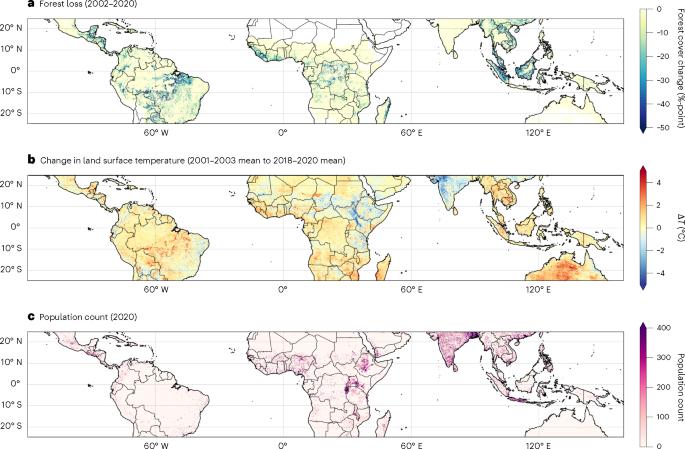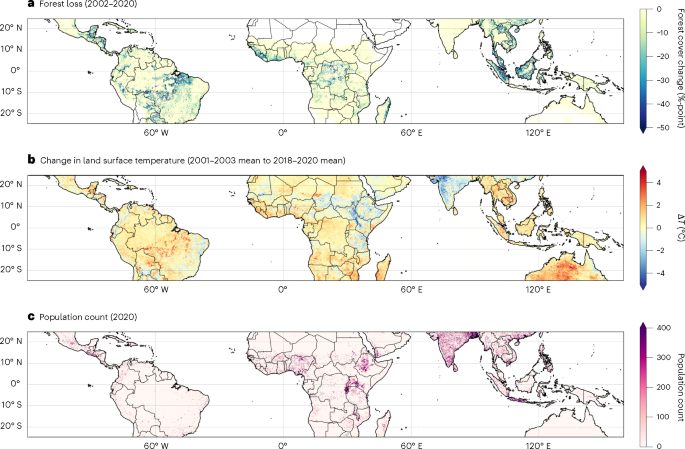热带森林砍伐与大量与热有关的死亡率有关
IF 27.1
1区 地球科学
Q1 ENVIRONMENTAL SCIENCES
引用次数: 0
摘要
热带森林砍伐导致当地变暖,是一种潜在的人类健康风险,与人类热应激升高和室外安全工作时间减少有关。在这里,我们显示,使用泛热带评估,毁林引起的局部变暖与每年28,000例(95%置信区间:23,610-33,560)与热相关的死亡有关。对卫星数据的分析显示,2001-2020年期间热带森林砍伐使3.45亿人受到局部变暖的影响,人口加权的白天地表变暖为0.27°C。与热有关的死亡率估计在东南亚最高(每10万人中有8-11人死于森林砍伐地区),其次是非洲和美洲的热带地区。在森林丧失的地区,毁林造成的局部变暖可能占与气候热有关的死亡总数的三分之一以上,突出表明在气候变化的背景下,热带毁林对持续变暖和与热有关的健康风险的重要贡献。本文章由计算机程序翻译,如有差异,请以英文原文为准。


Tropical deforestation is associated with considerable heat-related mortality
Tropical deforestation induces local warming and is a potential human health risk, having been linked to elevated human heat stress and reduced safe outdoor working hours. Here we show deforestation-induced local warming is associated with 28,000 (95% confidence interval: 23,610–33,560) heat-related deaths per year using a pan-tropical assessment. Analysis of satellite data shows tropical deforestation during 2001–2020 exposed 345 million people to local warming with population-weighted daytime land surface warming of 0.27 °C. Estimated heat-related mortality rates are greatest in Southeast Asia (8–11 deaths for every 100,000 people living in deforested areas) followed by tropical regions of Africa and the Americas. In regions of forest loss, local warming from deforestation could account for over one third of total climate heat-related mortality, highlighting the important contribution of tropical deforestation to ongoing warming and heat-related health risks within the context of climate change. The authors assess the impacts of tropical deforestation and its subsequent local warming on human heat-related mortality. They estimate that deforestation-related warming (+0.27 °C) is associated with approximately 28,000 heat-related deaths per year.
求助全文
通过发布文献求助,成功后即可免费获取论文全文。
去求助
来源期刊

Nature Climate Change
ENVIRONMENTAL SCIENCES-METEOROLOGY & ATMOSPHERIC SCIENCES
CiteScore
40.30
自引率
1.60%
发文量
267
审稿时长
4-8 weeks
期刊介绍:
Nature Climate Change is dedicated to addressing the scientific challenge of understanding Earth's changing climate and its societal implications. As a monthly journal, it publishes significant and cutting-edge research on the nature, causes, and impacts of global climate change, as well as its implications for the economy, policy, and the world at large.
The journal publishes original research spanning the natural and social sciences, synthesizing interdisciplinary research to provide a comprehensive understanding of climate change. It upholds the high standards set by all Nature-branded journals, ensuring top-tier original research through a fair and rigorous review process, broad readership access, high standards of copy editing and production, rapid publication, and independence from academic societies and other vested interests.
Nature Climate Change serves as a platform for discussion among experts, publishing opinion, analysis, and review articles. It also features Research Highlights to highlight important developments in the field and original reporting from renowned science journalists in the form of feature articles.
Topics covered in the journal include adaptation, atmospheric science, ecology, economics, energy, impacts and vulnerability, mitigation, oceanography, policy, sociology, and sustainability, among others.
 求助内容:
求助内容: 应助结果提醒方式:
应助结果提醒方式:


